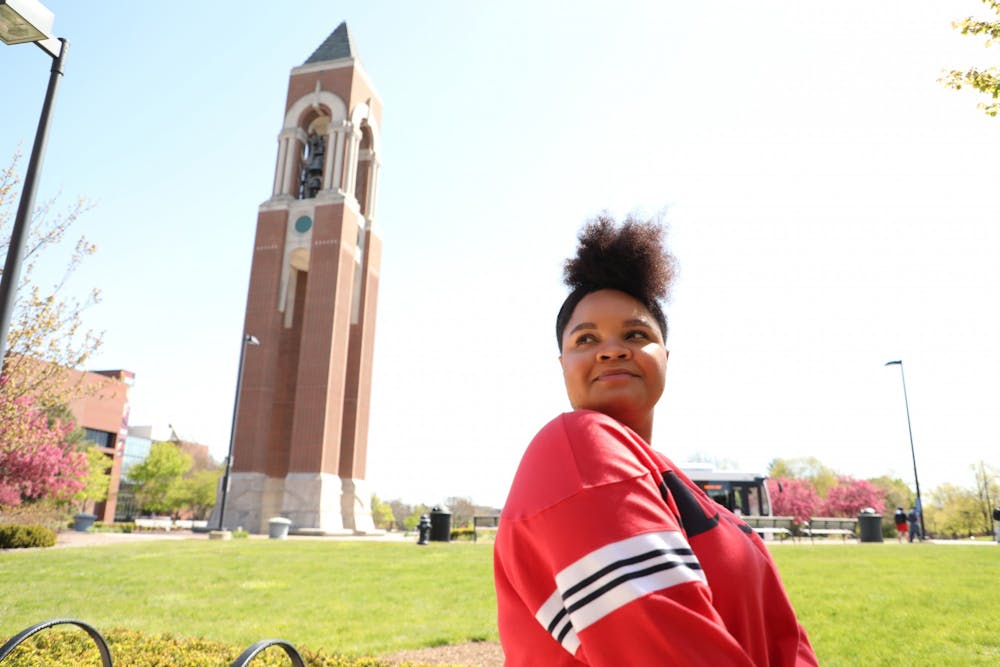Learn more about the AFAM 150 course
In spring 2022, the class will be taught by Emily Rutter, associate professor of English and co-chair of the African American Studies program, and will be available for three credit hours Tuesdays and Thursdays.
Course Description: Understand Race, Anti-racism and Intersectionality considers the intersections of racism with other oppressive ideologies, such as sexism, classism and homophobia. By the end of the course, students will be able to apply their knowledge of race and anti-racism to make Ball State’s campus, other communities and our nation a more inclusive place.
Source: Emily Rutter, associate professor of English and co-chair of the African American Studies program
After 2020 brought forth more conversations and raised awareness of racism and biases, senior interpersonal communications major Lauren Reynolds saw an opportunity to develop her skills in her future career.
Reynolds hopes to become an independent anti-racist consultant after she graduates in May 2021. She said the African American Studies program helped her learn about issues students of color face on and off campus.
Reynolds was introduced to the African American Studies minor early in her college career. She attended a screening of the movie “I Am Not Your Negro,” a documentary about the life of James Baldwin, held by Associate Professor of English Emily Rutter and Former Assistant Professor of History Simon Balto in 2017.
“I just fell in love with the way [Balto] talked about Baldwin,” Reynolds said. “I was like, ‘I really want to be a part of [the minor].’”
Reynolds said the minor has allowed her to discuss content that wasn’t taught in K-12 schools.
“I did grow up in a Black household, and my parents did teach me some Black history,” Reynolds said, “but it was a further diving into it as a young adult, with the nuances of having more adult responsibilities and being around people my age who actually wanted to talk about it.”
Reynolds’ favorite class in the minor was a course on Black sociology, taught by sociology graduate student John Anderson. Reynolds said the program allowed her to discuss her experiences as a woman of color in a predominately white institution in a safe space where she “can feel comfortable” bringing up race-related topics.
Reynolds said she hopes the African American Studies minor will eventually develop into a major.
“I hope that Ball State evolves and is more intersectional and inclusive,” Reynolds said. “As much as there are people who are trying to help, I don’t feel like they’re given the attention, or the platform or the time.”
Rutter and Kiesha Warren-Gordon, associate professor of criminal justice and criminology, are the current co-chairs of the African American Studies program.
“If you go back and look at the history of African American Studies programs across the country, in the ’60s and ’70s, those programs were developed out of protest,” Warren-Gordon said. “In some situations, [these were] violent protests expressing the needs of the students and in terms of what they wanted to see in their education.”
The African American Studies minor was relaunched at Ball State in 2017 because of “student calls for more coursework and programming about Black experiences,” Rutter said in an email.
“More recently, there’s been student demand for classes that are specifically focused on anti-racism and intersectionality,” Rutter said.
Rutter said a survey sent out in the fall 2020 semester found student interest in a course focused on anti-racism, understanding race and intersectionality “was really high.” Due to this interest, the class, African American Studies 150, will be adopted into Ball State’s core curriculum as an option for humanities requirements. The course will be taught for the first time in spring 2022.
Warren-Gordon said there are currently between 40 and 50 students in the African American Studies program, but Rutter and Warren-Gordon hope interest will grow when the AFAM 150 course becomes part of the university course catalog.
“There has always been a group of students who wanted to know more about who they are and to center their lives within their academic learning,” Warren-Gordon said.
Rutter said she and Warren-Gordon want to make sure everything is in place to set the enrolled students up for success within the minor and future major.
Reynolds said her time in the African American Studies program has allowed her to pick a career in which she can apply her new skills.
“I don’t really want to be subservient to whatever system or job I have after I graduate,” Reynolds said. “I want to be able to talk about issues that I care about or that affect me because, if we don’t talk about them, then we don’t resolve them.”
Contact Mackenzie Rupp with comments at msrupp@bsu.edu or on Twitter at @kenzieer18.





